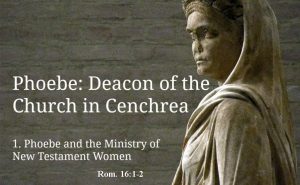
 Good evening, folks. We come together once again in our ongoing study of the church. After spending several weeks looking at the qualifications for elders… for the shepherds put in place by God to care for His church… we now come to the office of deacon. Here, we see a similar pattern in how the office came to be named. The spiritual leaders of the church were designated “elders”, “shepherds”, or “overseers” because they were familiar terms in general use and easily understood. The term “elder” served as a designation for men who were entrusted to dispense justice and lead in the administration of the city and synagogue for hundreds of years. The term “shepherd” was likewise used as a designation for the spiritual leaders of Israel, whether king, judge, or prophet. We saw in past weeks that the Lord is designated our shepherd, so it is fitting that those leading His people under his headship would be designated “shepherds” as well. The term “overseer”, likewise has a rich tradition of use and was readily understood. The overseer was one who was the steward of the resources of the master… and we see this term in use as early as the 39th chapter of Genesis. So, why do I bring this up? And how does it relate to deacons?
Good evening, folks. We come together once again in our ongoing study of the church. After spending several weeks looking at the qualifications for elders… for the shepherds put in place by God to care for His church… we now come to the office of deacon. Here, we see a similar pattern in how the office came to be named. The spiritual leaders of the church were designated “elders”, “shepherds”, or “overseers” because they were familiar terms in general use and easily understood. The term “elder” served as a designation for men who were entrusted to dispense justice and lead in the administration of the city and synagogue for hundreds of years. The term “shepherd” was likewise used as a designation for the spiritual leaders of Israel, whether king, judge, or prophet. We saw in past weeks that the Lord is designated our shepherd, so it is fitting that those leading His people under his headship would be designated “shepherds” as well. The term “overseer”, likewise has a rich tradition of use and was readily understood. The overseer was one who was the steward of the resources of the master… and we see this term in use as early as the 39th chapter of Genesis. So, why do I bring this up? And how does it relate to deacons?
Well, when we come to the office of deacon, we see the same pattern of using a term already familiar and in use. But this has led some to question whether this is a reference to an office in the church or a more general designation for anyone helping. You see, the term for “deacon” is diakonos, which simply means “servant” or “attendant”… a helper, if you will. Like the terms “elder”, “shepherd”, and “overseer”, where the vast majority of the times they are used they do not refer to the office, the same is true for the term “diakonos”, or deacon. The word is most often used to merely designate a servant. But in 1Tim 3, it is clear that an office is in mind. Like elders, deacons are required to meet certain qualifications. When Paul writes to the church at Phillippi, he directs the letter to “To all the saints in Christ Jesus who are in Philippi, including the overseers and deacons”. It seems likely, in this passage, that overseers and deacons are both seen as “formal” designations for offices in the church. In the same manner that Paul writes to Timothy and Titus to assist them in the appointment of elders, Paul gives Timothy instruction on the appointment of deacons.
But before we get into the te xt, we might want to ask the question, “Where did the office of “deacon” originate?” Nowhere in the history of the church do we see a scene that shows the creation of the office with absolute clarity. But there is a scene that shows the likely origin of the office of deacon in actuality or in concept… and that is found in Acts 6:1ff. “Now at this time while the disciples were increasing in number, a complaint arose on the part of the Hellenistic Jews against the native Hebrews, because their widows were being overlooked in the daily serving of food. 2 So the twelve summoned the congregation of the disciples and said, “It is not desirable for us to neglect the word of God in order to serve tables. 3 Therefore, brethren, select from among you seven men of good reputation, full of the Spirit and of wisdom, whom we may put in charge of this task. 4 But we will devote ourselves to prayer and to the ministry of the word.” 5 The statement found approval with the whole congregation; and they chose Stephen, a man full of faith and of the Holy Spirit, and Philip, Prochorus, Nicanor, Timon, Parmenas and Nicolas, a proselyte from Antioch. 6 And these they brought before the apostles; and after praying, they laid their hands on them.”
xt, we might want to ask the question, “Where did the office of “deacon” originate?” Nowhere in the history of the church do we see a scene that shows the creation of the office with absolute clarity. But there is a scene that shows the likely origin of the office of deacon in actuality or in concept… and that is found in Acts 6:1ff. “Now at this time while the disciples were increasing in number, a complaint arose on the part of the Hellenistic Jews against the native Hebrews, because their widows were being overlooked in the daily serving of food. 2 So the twelve summoned the congregation of the disciples and said, “It is not desirable for us to neglect the word of God in order to serve tables. 3 Therefore, brethren, select from among you seven men of good reputation, full of the Spirit and of wisdom, whom we may put in charge of this task. 4 But we will devote ourselves to prayer and to the ministry of the word.” 5 The statement found approval with the whole congregation; and they chose Stephen, a man full of faith and of the Holy Spirit, and Philip, Prochorus, Nicanor, Timon, Parmenas and Nicolas, a proselyte from Antioch. 6 And these they brought before the apostles; and after praying, they laid their hands on them.”
We see that there was a complaint that arose because some of the Hellenistic widows… those of Grecian heritage… were being overlooked in their daily distribution of food and material goods. There is nothing to suggest that it was being done deliberately nor do we know who was responsible for overseeing the task. But for whatever reason, it was creating a division between the Jewish believers… those of Grecian background and those of native, or Hebrew, background. Note that this was before the scattering because of persecution (Acts 8) and before the gospel was brought to the Gentiles (Acts 10), so the church at this time was made up of converted Jews. While it was important to address this issue, as it gave grounds for growing dissension and division, it was not something that should be the responsibility of the apostles. They had a higher calling… to study and proclaim the word of God and to be in prayer for spiritual discernment and guidance in their ministries and for protection over the new church that God was building. So the apostles instructed the congregation… all those followers of Jesus meeting together in Jerusalem… to select from themselves seven men, qualified to oversee the distribution to  the widows. Just as we see certain qualifications specified for elders and deacons in 1 Tim 3, here too we see that the men were to have certain qualifications. They were to be men, literally, “of testimony”; trustworthy, having a good reputation among the people. They were also to be deeply spiritual men… men whose lives exhibited maturity… “full of the Spirit”. Finally, they were to display wisdom in their walk and thinking… they were to be men of discernment and practitioners of God’s word. While nowhere in this passage are they called “deacons”, they were possibly the first deacons or, at least, the earliest expression of the idea… the concept… of the office of deacon. After the selection by the congregation, the apostles prayed to discern God’s will in the matter and, after having done so, confirmed the appointments. These men, then, were selected to take on an administrative task important in the life of the church but a task that would serve as a distraction from the apostles more important duties.
the widows. Just as we see certain qualifications specified for elders and deacons in 1 Tim 3, here too we see that the men were to have certain qualifications. They were to be men, literally, “of testimony”; trustworthy, having a good reputation among the people. They were also to be deeply spiritual men… men whose lives exhibited maturity… “full of the Spirit”. Finally, they were to display wisdom in their walk and thinking… they were to be men of discernment and practitioners of God’s word. While nowhere in this passage are they called “deacons”, they were possibly the first deacons or, at least, the earliest expression of the idea… the concept… of the office of deacon. After the selection by the congregation, the apostles prayed to discern God’s will in the matter and, after having done so, confirmed the appointments. These men, then, were selected to take on an administrative task important in the life of the church but a task that would serve as a distraction from the apostles more important duties.
So, we see in Acts 6 the apostles serving in the roles which would later become “elders”. In the same way, we can see these men serving in the roles that would later become deacons. And can I share with you a slightly off-topic but noteworthy fact? All the men selected to serve were from the Hellenistic group… they all had Greek names! Well, you may say, they just had the largest group, so they were able to get their people in. No, nothing could be further from the truth; the Hebrew Jews… those native to Jerusalem and the surrounding towns… would have been the larger group by far. But such was the love and trust of the growing Jerusalem church for each other that the congregation as a whole chose the minority who had the complaint to oversee the future distributions. They wanted to ensure that the complaint was addressed and that unity would be maintained. They were not interested in “political correctness” or the appearance of “equity”. They did not count the numbers in each group and apportion the seven positions accordingly. They just said, “You who have the complaint…, we trust you to remedy the situation in a loving and wise manner.”
Let us, at this point, return to our text for this evening, 1 Tim 3:8-13. We read, “Deacons likewise must be men of dignity, not double-tongued, or addicted to much wine or fond of sordid gain, 9 but holding to the mystery of the faith with a clear conscience. 10 These men must also first be tested; then let them serve as deacons if they are beyond reproach. 11 Women must likewise be dignified, not malicious gossips, but temperate, faithful in all things.12 Deacons must be husbands of only one wife, and good managers of their children and their own households. 13 For those who have served well as deacons obtain for themselves a high standing and great confidence in the faith that is in Christ Jesus.”
 Deacons are to be men of dignity… literally “of honor”… and not “double tongued. They are not hypocritical, behaving or speaking differently before different people, in order to achieve their ends. We are also told that they are to be men who are “holding to the mystery of the faith with a clear conscience”. This simply refers to men who are holding fast to the gospel and the word of God in their beliefs and their behavior. They examine themselves against the word of God and have a clear conscience regarding their adherence to His word. We also see that they are to have many of the same characteristics we found for elders… not overly interested in wine and drink, not fond of sordid gain, beyond reproach, husbands of one wife, good managers of their homes. These qualities have been discussed at length over the last several weeks so, in the interest of time, we will not address them again here. I encourage you to go back to our previous studies on eldership if you want to refresh your memory of what these qualifications mean and require.
Deacons are to be men of dignity… literally “of honor”… and not “double tongued. They are not hypocritical, behaving or speaking differently before different people, in order to achieve their ends. We are also told that they are to be men who are “holding to the mystery of the faith with a clear conscience”. This simply refers to men who are holding fast to the gospel and the word of God in their beliefs and their behavior. They examine themselves against the word of God and have a clear conscience regarding their adherence to His word. We also see that they are to have many of the same characteristics we found for elders… not overly interested in wine and drink, not fond of sordid gain, beyond reproach, husbands of one wife, good managers of their homes. These qualities have been discussed at length over the last several weeks so, in the interest of time, we will not address them again here. I encourage you to go back to our previous studies on eldership if you want to refresh your memory of what these qualifications mean and require.
We now come to the section of our text that has some interpretive difficulties. It is found in verse 11. “Women must likewise be dignified, not malicious gossips, but temperate, faithful in all things.” Of whom is this verse speaking? Here I have to ask you to hunker down, put on your thinking caps, and get ready to work through some fairly complex arguments with me. The word translated “women” can just as legitimately be translated “wives”, so it can be referring to either woman who serve as deacons or the wives of deacons. But if we take it to mean deacon’s wives, two questions arise; “Why does Paul not use a possessive pronoun like “their” to make it clear? He certainly could have, and that would have avoided any possibility of misunderstanding. If the text read “their wives” it would be clear. Another problem with this understanding… and a more serious one in my mind… is it raises another question, “Why would the wives of deacons be subject to certain qualifications when nothing is said about the wives of elders… arguably the more important office of the two?” So I am persuaded that the most likely correct translation would be “deaconesses”.(2)
But this raises a question as well…”Why doesn’t he just call them that?” Well, it appears that at the time of Paul’s writing, there was no feminine form of the Greek word used, “diakonos”(1). This is supported by the fact that, when writing about Phoebe in Romans 16:1, Paul uses the masculine form even though she was a woman. Additional support for this view is found when we look at how Paul uses the term “likewise” in this passage. Paul starts off the chapter talking about the qualification for the office of “overseer” or elder. When he moves to discuss the qualifications for the office of “deacon”, he marks the shift by using the term, “likewise”; “Deacons likewise must be men of dignity… “. He does the same thing when shifting to talk about the qualifications for “women”; “Women must likewise be dignified…”. This could likely support the argument that Paul is now talking about a separate office, or sub-office, that of deaconess.
 So, why make a distinction between “deacon” and “deaconess”? I believe the most likely reason would be that they would have differing spheres of service. Deacons would be able to serve in positions of authority if needed; deaconesses could serve in positions where they would not be exercising authority or where their oversight would be limited to women and children. Even as I say this, it makes me kind of cringe when I think of all the ways statements like this could be, and have been, misconstrued. While it is easy to complain that the biblical writers were influenced by a male dominated culture, this kind of thinking does a disservice to God’s word. While scripture makes it clear that “there is neither male nor female, Jew nor Greek, slave nor free” in reference to salvation and sanctification in Christ, it is equally clear that there are principles of headship and submission that exist in the operations of family and church. While time does not allow a full investigation of these principles this evening, we can look at several of the verses that show them.
So, why make a distinction between “deacon” and “deaconess”? I believe the most likely reason would be that they would have differing spheres of service. Deacons would be able to serve in positions of authority if needed; deaconesses could serve in positions where they would not be exercising authority or where their oversight would be limited to women and children. Even as I say this, it makes me kind of cringe when I think of all the ways statements like this could be, and have been, misconstrued. While it is easy to complain that the biblical writers were influenced by a male dominated culture, this kind of thinking does a disservice to God’s word. While scripture makes it clear that “there is neither male nor female, Jew nor Greek, slave nor free” in reference to salvation and sanctification in Christ, it is equally clear that there are principles of headship and submission that exist in the operations of family and church. While time does not allow a full investigation of these principles this evening, we can look at several of the verses that show them.
1 Cor 11:3 says, “But I want you to understand that Christ is the head of every man, and the man is the head of a woman, and God is the head of Christ.”
Eph 5:22ff says, “Wives, be subject to your own husbands, as to the Lord. 23 For the husband is the head of the wife, as Christ also is the head of the church, He Himself being the Savior of the body. 24 But as the church is subject to Christ, so also the wives ought to be to their husbands in everything.
1 Tim 2:11 says, “ A woman must quietly receive instruction with entire submissiveness. 12 But I do not allow a woman to teach or exercise authority over a man, but to remain quiet.”
1 Pet 3:1 says, “In the same way, you wives, be submissive to your own husbands so that even if any of them are disobedient to the word, they may be won without a word by the behavior of their wives”
So it is obvious that there are differing roles and positions between men and women in the church and family. This being the case, it makes sense that Paul would make a distinction between the positions of “deacon” and “deaconess” as they would function differently in the church.
The offices of deacon and deaconess are important ones in the church. They are called by God to assist the elders in the operation and administration of the church. Like the elders, they are to be examples to the church in their behavior, attitude, and service. They, too, have a high calling and high standards of conduct and character. And we see, in vs 13, that they obtain for themselves a high standing as well. We read, “For those who have served well as deacons obtain for themselves a high standing and great confidence in the faith that is in Christ Jesus.”
Beloved, as we close this section, it is my hope that you would consider God’s calling in your life and seek to fulfill that calling. As you will recall, we all have a unique position and giftedness in the Body of Christ and have a role in its health and growth. Let us pray that we are good stewards of what we have been given.
Let us pray.
(1)An article on the Northwest Baptist Seminary website says this; “Howard Marshall in The Pastoral Epistles (London: T. & T. Clark, 1999), 493 notes that “no feminine form of diakonos existed to serve as a technical designation.” William Mounce, Pastoral Epistles (Nashville, TN: Thomas Nelson Publishers, 2000), 202 says that “the feminine form of the word diakonos (diakonissa) had not yet been created.”So diakonissa was not a option for Paul at this time. By far the majority of uses documented come much later than the New Testament period. The major Classical Greek Lexicon compiled by Liddell and Scott list one example found in an inscription, but it offers no proposed dating for this inscription. So I think that Marshall and Mounce are right in saying that a feminine form diakonissa did not exist when Paul was writing 1Timothy”
(2) While I am persuaded (not certain!) that the text is talking about deaconesses, there are many knowledgeable and spiritually mature men that take the differing view… that the reference is to deacon’s wives. It does not change the underlying reality and focus that men and women involved in ministry are to be people that are spiritually mature and qualified to lead and serve. That is why Paul writes these words to those who are entrusted to establish godly leadership in the church.

0 Comments